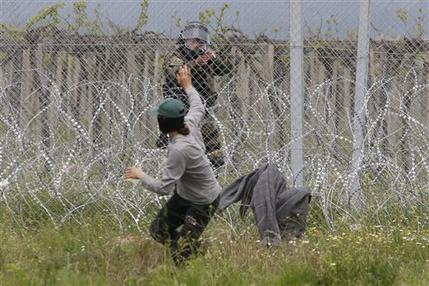THE LATEST: Croatia, Albania join to block migrants

A migrant man trying to remove barbed wire along the fence clashes with Macedonian police at the northern Greek border point of Idomeni, Greece, Wednesday, April 13, 2016. New clashes have broken out between Macedonian police and stranded refugees and other migrants trying to scale a fence on Greece’s border with the country. (AP Photo/Amel Emric)
The Latest on European efforts to respond to the wave of migration (all times local):
3:15 p.m.
Defense ministers from Croatia and Albania say the two countries will work together to prevent possible opening of a new migrant corridor through their territories after Balkan nations closed their borders.
Croatia's Defense Minister Josip Buljevic and Albania's Mimi Kodheli agreed Thursday to exchange information and jointly act in case migrants try to reach EU member Croatia over the Adriatic Sea from Albania.
The state HINA news agency quoted Buljevic as saying: "We can do a lot to prevent the migrant wave."
Albania borders Greece, where tens of thousands of migrants have been stranded after the closure of the Balkan corridor toward the European Union.
—
3:05 p.m.
Rights group Amnesty International says the religious leaders visit to the Greek island of Lesbos was a "golden opportunity to expose the disturbing plight of thousands of refugees and migrants arbitrarily detained there since the ill-begotten EU-Turkey deal came into force on 20 March."
Gauri van Gulik, deputy director for Europe at Amnesty International, called on the pope to "speak out about the violations, fear and uncertainty suffered by thousands of refugees and migrants trapped in limbo on Lesbos and elsewhere in Greece."
Pope Francis will be accompanied by Ecumenical Patriarch Bartholomew I, the spiritual leader of Orthodox Christians, and Athens Archbishop Ieronymos, the head of the Church of Greece.
—
2:35 p.m.
Austria and nine East European and Balkan states are calling for an EU declaration endorsing the use of military aircraft for the deportation of migrants who have no chance for asylum, or whose request for that status have been rejected
The Austria Press Agency says the request is being made in a letter to EU foreign policy chief Federica Mogherini, signed by Austrian Defense Minister Hans Peter Doskozil on behalf of Austria and the other countries.
APA on Thursday quoted the letter as saying the use of military aircraft should be "seen as an integral and decisive element of a full repatriation program." The agency said the letter asked for the issue to be on the agenda of the next EU foreign ministers' meeting in Luxembourg on April 19.
—
1:20 p.m.
Human Rights Watch issued a statement criticizing what it said were the "deplorable conditions" in which about 4,000 people were being detained on the Greek islands of Lesbos and Chios.
Eva Cossé, HRW's Greece specialist, said: "The EU's policy, carried out in Greece, has locked up families and others who have fled horrors such as ISIS terror, Taliban threats, or Syrian-government barrel bombs."
The group said Thursday that "blanket detention of all asylum seekers and migrants in closed facilities is unjustified, given the possibility of less restrictive options, and amounts to arbitrary detention. The two closed facilities should be converted into open camps with appropriate services and safety for people needing protection from war, persecution, and human rights abuses."
The statement also said: "Turkey cannot be considered a safe country due to its refusal to grant effective protection to non-Europeans in need, including Afghans and Iraqis."
—
10:45 a.m.
Austria's defense minister says the country is ready to completely close the main border crossing to Italy in case an influx of migrants leads to an "extreme situation."
State-run broadcaster ORF on Thursday quoted Hans Peter Doskozil as saying such a move at the Brenner crossing would be taken if Italy refused to accept migrants turned back by Austria and they could not proceed to Germany.
Doskozil says Austria has registered between 16,000 and 17,000 applications for asylum since the start of the year. The country has announced a cap of 37,500 applications for 2016 after receiving about 90,000 last year.
He expresses skepticism about the EU-Turkey agreement on migrant returns saying "we don't know how long the deal will last."
—
9:55 a.m.
Germany's governing parties say they've agreed upon a broad range of measures to help the country integrate those of the 1.1 million migrants who arrived last year who are granted asylum.
The measures announced Thursday, which will be discussed with state governors before they're formalized to present to Parliament, seek to strike a balance between giving migrants easier access to jobs and integration courses, while increasing expectations of them as well.
They foresee creating thousands of government-funded "job opportunities" for migrants, news agency dpa reported, and the suspension for three years of a rule that asylum-seekers are initially excluded from jobs unless no German or European Union citizen can fill them.
Waiting times for integration courses teaching German will be reduced, but they'll be made mandatory for more migrants.
—
9:30 a.m.
Serbian police say they have arrested six people suspected of smuggling migrants across the border to Hungary and other EU countries.
The six face charges of illegally crossing the state border and people smuggling.
Police said Thursday that the suspects charged the migrants from 900-1,200 euros ($1,000-$1,350) for the illegal transfer. They say the migrants were from Kosovo, Asian and African countries.
Migrants fleeing war and poverty have turned to smugglers to help them reach wealthy European nations after Balkan countries closed their borders for the passage.
© 2016 The Associated Press. All rights reserved. This material may not be published, broadcast, rewritten or redistributed. Learn more about our Privacy Policy and Terms of Use.
Политика конфиденциальности | Правила пользования сайтом








